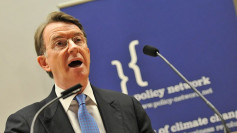The Bank of England lowered its benchmark interest rate by 25 basis points to 4.25% on Thursday, citing the mounting impact of U.S. President Donald Trump's sweeping trade tariffs and the resulting slowdown in global growth. The decision, which revealed a rare split among policymakers, is the central bank's first move since the White House imposed a wide array of new levies on April 2.
The Monetary Policy Committee voted 5-4 in favor of the cut. Two members, Swati Dhingra and Alan Taylor, advocated for a deeper 50-basis-point reduction, while Chief Economist Huw Pill and external member Catherine Mann preferred to keep rates unchanged. The rate cut reflects concern that Trump's tariffs are dragging on the international economy, with the International Monetary Fund recently revising down its growth forecasts for major economies, including the UK.
Governor Andrew Bailey said the move was necessary in light of recent volatility. "The past few weeks have shown how unpredictable the global economy can be. That's why we need to stick to a gradual and careful approach to further rate cuts," he said at a press conference.
Markets reacted with mixed signals. Yields on short-dated UK government bonds rose, while the pound strengthened modestly against the U.S. dollar. Some investors had speculated the BoE might signal more aggressive easing.
The BoE's statement said that while the impact of tariffs on the UK directly is limited, the broader global effects would suppress domestic growth and inflation. It projected that U.S. tariffs would reduce the size of the UK economy by 0.3% over three years. Inflation, which was 2.6% in March, is now expected to peak around 3.5%-below the earlier forecast of 3.75%-before returning to the 2% target in early 2027.
The rate cut will be welcomed by borrowers, particularly the 591,000 homeowners with tracker mortgages, who are expected to see average monthly payments fall by £29, according to UK Finance. Fixed-rate borrowers, who make up 85% of the mortgage market, may benefit if lenders adjust rates in response. First-time buyers and those refinancing this year-about 1.6 million households-may also see lower costs.
The central bank's cautious tone was reinforced in its policy minutes, noting that "interest rates are not on autopilot." Bailey emphasized, "The MPC must continue to respond carefully to the evolving economic circumstances and the outlook for inflation in the UK."
Despite some strength in early-year data, the BoE noted a weaker underlying growth trend. It now expects GDP growth of just 1% this year, with a sharp downgrade to 1.25% for 2026. Near-term underlying growth is estimated at a sluggish 0.1% per quarter. Wage growth is forecast to fall from 6% to 3.75% by year-end, while unemployment is expected to inch up to 5% in 2026.
The BoE introduced new alternative scenarios in its modeling, including one with prolonged uncertainty curbing consumption and investment, and another that projects a wage-price spiral adding 0.4 percentage points to inflation.
Though the central bank stressed its "gradual and careful" language remains unchanged, the door appears open to quicker action. "With inflation risks increasingly tilting to the downside, a faster pace of rate cuts may become more palatable to a growing number of members," said Alpesh Paleja, deputy chief economist at the Confederation of British Industry.





